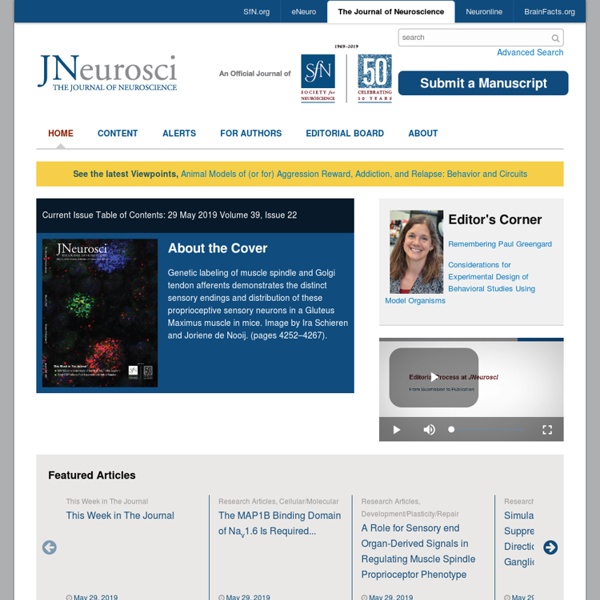



Nature Raphael Lis, Charles C. Karrasch, Michael G. Poulos, Balvir Kunar, David Redmond, Jose G. Barcia Duran, Chaitanya R. Badwe, William Schachterle, Michael Ginsberg, Jenny Xiang, Arash Rafii Tabrizi, Koji Shido, Zev Rosenwaks, Olivier Elemento, Nancy A. Speck, Jason M.
Medical Heritage Library Society for Neuroscience Nature Publishing Group : science journals, jobs, and information The Neurocritic Neuroscience Neuroscience is the scientific study of the nervous system.[1] Traditionally, neuroscience has been seen as a branch of biology. However, it is currently an interdisciplinary science that collaborates with other fields such as chemistry, computer science, engineering, linguistics, mathematics, medicine and allied disciplines, philosophy, physics, and psychology. It also exerts influence on other fields, such as neuroeducation[2] and neurolaw. Because of the increasing number of scientists who study the nervous system, several prominent neuroscience organizations have been formed to provide a forum to all neuroscientists and educators. History[edit] The study of the nervous system dates back to ancient Egypt. Early views on the function of the brain regarded it to be a "cranial stuffing" of sorts. The view that the heart was the source of consciousness was not challenged until the time of the Greek physician Hippocrates. Modern neuroscience[edit] Human nervous system
Neuro - electronics | neuroelectronics Quantified Self | Self Knowledge Through NumbersQuantified Self | Self Knowledge Through Numbers Science General Systematic endeavour to gain knowledge Science is a systematic discipline that builds and organises knowledge in the form of testable hypotheses and predictions about the universe.[1][2] Modern science is typically divided into two or three major branches:[3] the natural sciences (e.g., physics, chemistry, and biology), which study the physical world; and the social sciences (e.g., economics, psychology, and sociology), which study individuals and societies.[4][5] Applied sciences are disciplines that use scientific knowledge for practical purposes, such as engineering and medicine.[6][7][8] While sometimes referred to as the formal sciences, the study of logic, mathematics, and theoretical computer science (which study formal systems governed by axioms and rules)[9][10] are typically regarded as separate because they rely on deductive reasoning instead of the scientific method or empirical evidence as their main methodology.[11][12][13][14] Etymology History Early history Middle Ages Awards